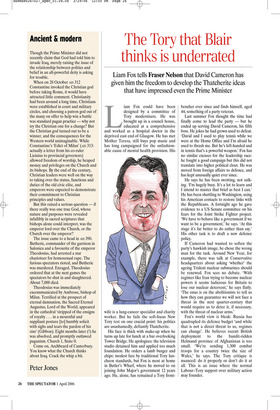Ancient & modern
Though the Prime Minister did not recently claim that God had told him to invade Iraq, merely raising the issue of the relationship between politics and belief in an all-powerful deity is asking for trouble.
When on 28 October AD 312 Constantine invoked the Christian god before taking Rome, it would have attracted little comment. Christianity had been around a long time, Christians were established in court and military circles, and choosing a patron god out of the many on offer to help win a battle was standard pagan practice — why not try the Christian one for a change? But the Christian god turned out to be a winner, and the consequences for the Western world unimaginable. While Constantine’s ‘Edict of Milan’ (AD 313: actually a letter from his co-ruler Licinius to provincial governors) allowed freedom of worship, he heaped money and privileges on the Church and its bishops. By the end of the century, Christian leaders were well on the way to taking over the status, functions and duties of the old civic elite, and emperors were expected to demonstrate their commitment to Christian principles and values.
But this raised a serious question — if there really was one true God, whose nature and purposes were revealed infallibly in sacred scriptures that bishops alone could interpret, was the emperor lord over the Church, or the Church over the emperor?
The issue came to a head in AD 390. Butheric, commander of the garrison in Salonica and a favourite of the emperor Theodosius, had arrested a star charioteer for homosexual rape. The furious spectators rioted, and Butheric was murdered. Enraged, Theodosius ordered that at the next games the spectators be shut in and slaughtered. About 7,000 died.
Theodosius was immediately excommunicated by Ambrose, bishop of Milan. Terrified at the prospect of eternal damnation, the Sacred Eternal Augustus, Lord of the World, appeared in the cathedral ‘stripped of the ensigns of royalty ... in a mournful and suppliant posture [to] humbly solicit with sighs and tears the pardon of his sins’ (Gibbon). Eight months later (!) he was absolved, and promptly outlawed paganism. Church 1, State 0.
Come on, Archbeard of Canterbury. You know what the Church thinks about Iraq. Crack the whip a bit.
Peter Jones


























































































 Previous page
Previous page